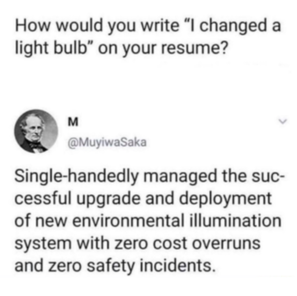|
What is employability? Well, break it down. Which two words can employability be split into? In the simplest sense it is your ability to be employed. The Oxford Dictionary definition of ability is ‘the fact that someone or something is able to do something;’. There are hundreds of different factors that make up this (and your unique) ability – far too many for me to list here – but that’s the point of this article. It is very easy to think that your employability begins and ends with a Curriculum Vitae (CV) – after all, isn’t that what you’ll send off to prospective employers? Surely a good CV will get you in the door, and a bad one won’t, and that’s the end of that? Curriculum Vitae translates from Latin to a ‘course of life’. With a CV you should do everything in your power to make it as representative to yourself – and your professional journey so far - as possible. And this is the crucial point. Merely using some fancy words and twisting the truth to make yourself look better isn’t going to cut it. Employers can see through this in a heartbeat, and even if by some stroke of luck you ended up being offered an interview, what then? What if you are asked any details about your environmental illumination system upgrade? Your two choices are lie, or tell the truth, and neither option is going to be good for your chance of getting the job. No. To truly maximise your employability you need to be honest about your skills, and to do that you need to understand two things:
Firstly, what it is you have to offer. You probably won’t be an expert at whatever role it is that you're applying for, especially not if it's an entry-level job, and the good news here is that employers aren’t expecting you to be. Being competent at one specific role uses hard skills, specific abilities that you can do for a specific role, such as knowing how to design a rollercoaster, and create a 3D model of it in a software programme. A valued hard skill (particularly for the joy it brings 1,000s of theme park goers) but it doesn’t translate over into anything else…like the ability to tune a piano or drain a radiator. Employers are fully expecting to train you in the specific hard skills that the job requires. What they are looking for is someone who is able – and willing – to learn. And learning is a cycle which involves receiving feedback (not always positive), handling challenges and some failures, and developing yourself (and your knowledge) from it. This brings us to the other type of skill. Soft skills. These are skills that don’t have any one usage, but are broadly applicable to every job – and aspect of life. You already have some level of soft skills that employers are looking for – the ability to communicate, to navigate social situations, to problem solve, to empathise with (and work with) others, to be a pleasant person to be around. These are all skills, and they are all criminally overlooked when it comes to employability. Common sense is hotly debated as a soft skill too, as not everyone has it. Employers aren’t looking for robots – if they were, they’d get robots. Instead they want people, and it is important to remember this. You are more likely to get a job by being friendly and eager to learn than someone who is incredibly competent but horrible to be around. I think that bears repeating: You are more likely to get a job by being friendly and eager to learn than someone who is incredibly competent but horrible to be around. It is not uncommon for CEOs (of often very large companies) to ask receptionists what the behaviour of each interviewee (the person being interviewed) was like…as you make your first impression, without your ‘interview head’ on and as a human being, to the receptionist. As our guest speaker Ben – who works for one of the biggest global construction firms highlights: 'Companies want to buy you as a human being. Great people make great teams, and great teams make great organisations.' Charlie Chaplin said: 'Judge a man not by how he treats his equals, but his inferiors', (not that there's anything wrong with being a receptionist, of course). You might be a perfect candidate, but if you’ve been rude to a receptionist, or clearly acted in a different way to anyone else outside the interview room, you’ve quite often not got the job. This can be summed up by the acronym, BAP – Behaviour, Attitude, Personality. Each of these things is within your control, and each of these things can be worked on and developed. Once you have discovered which unique set of soft skills you possess, you will be able to develop them, through work, independent study, hobbies, and volunteering/experiences. When writing a CV you are encouraged to put your interests and hobbies on there. Do so. But make sure to show how these interests and hobbies make you better suited to the job than anyone else. For example, I used to work at a Falconry Centre (a zoo for birds of prey) because I wanted to do zoology at university. I didn’t – I was incredibly bad at biology – and ended up studying history. One of the skills you need as a historian is public speaking – the ability to stand up in front of others and convincingly argue your theories. What had I learnt at the Falconry Centre doing flying displays? Public speaking. Which soft skill do I primarily have to use in delivering Push Talks? Public speaking. As Covid has shown us, the world – and the world of work – is a rapidly changing place. Unexpected things happen, and they change the work environment in unpredictable ways. Anyone who claims to tell you they know exactly what the job market will look like in 5 years is lying. It is unpredictable, and so trying to build your employability based solely on one narrow goal is wrong. Develop your soft skills, develop your BAP, develop as many professional contacts as possible across a range of industries…and become a flexible and rounded individual, so that no matter what happens, you will always have something to offer someone. You might think it is mere luck whether or not you get an interview or a job, but always bear in mind what the Roman philosopher Seneca said - 'Luck is what happens when preparation meets opportunity'. AuthorGuy Reynolds is a graduate of Cardiff University with a BA in Ancient History and an MA in Ancient and Medieval Warfare. He was the first person in his family that went into postgraduate study after securing his undergraduate degree. Guy’s plan is to gain his doctorate and spend his life studying increasingly niche areas of history. Guy has lots of experience working with wild animals, from Falconry Centres to Wetherspoons, and he loves anything to do with books.
0 Comments
Your comment will be posted after it is approved.
Leave a Reply. |
This section will not be visible in live published website. Below are your current settings: Current Number Of Columns are = 1 Expand Posts Area = Gap/Space Between Posts = 15px Blog Post Style = card Use of custom card colors instead of default colors = Blog Post Card Background Color = current color Blog Post Card Shadow Color = current color Blog Post Card Border Color = current color Publish the website and visit your blog page to see the results Categories
All
We're always interested to hear from talented young writers, so if you'd like to feature as a guest author then hit us up for more details.
|
Student blog: What's new?
Author
Write something about yourself. No need to be fancy, just an overview.
This website uses marketing and tracking technologies. Opting out of this will opt you out of all cookies, except for those needed to run the website. Note that some products may not work as well without tracking cookies.
Opt Out of Cookies


 RSS Feed
RSS Feed